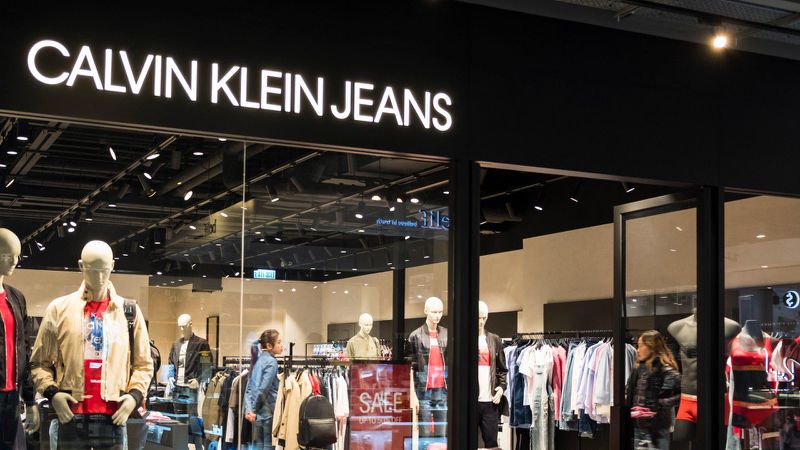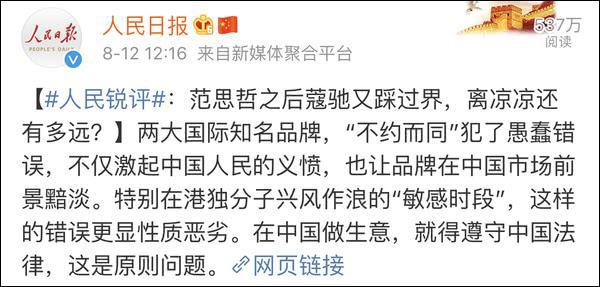From Versace to Calvin Klein: Major brands apologize for undermining China’s territorial sovereignty
From Versace to Calvin Klein: Major brands apologize for undermining China’s territorial sovereignty

Several international retailers and fashion houses have recently found themselves in apology mode after being slammed for disrespecting China’s national sovereignty in their products or on their websites.
Increasingly, mainlanders are forcing big brands to take a stance on China’s territorial disputes, specifically as it pertains to Hong Kong and Taiwan. This patriotism-driven frenzy is expected to continue as unrest in Hong Kong continues to escalate.
On Sunday, Chinese internet users called out Italian luxury fashion label Versace for one of its t-shirts, which listed Hong Kong and Macau as independent countries. The brand quickly responded to the criticism with a statement on Weibo, saying that it “deeply apologizes for the influence caused” by the design and admitting that it made a mistake due to negligence.
“We want to reiterate that we love China and adamantly respect China’s territorial integrity,” it said, adding that the offending items have been pulled from stores and would be destroyed.
Shortly thereafter, Yáng Mì 杨幂, China’s top actress with more than 100 million followers on Weibo, announced (in Chinese) the termination of her contract with Versace as the brand’s China ambassador. “As a Chinese citizen, Yang Mi was extremely upset and irritated about the news,” JiāXíng 嘉行, the celebrity’s agency, said in a strongly-worded statement. “The sovereignty and territorial integrity of China allows no offense. It’s every Chinese citizen’s bounden duty to endorse the ‘One China’ policy and protect the unification of our motherland.”
Following Versace’s ordeal, American fashion brand Coach found itself in hot water yesterday morning after a popular blogger demanded it explain why one of its t-shirts implies that Hong Kong and Taiwan are countries separate from China. Coach’s store location search function on its website also listed those two regions as independent countries.
Internet users in China swiftly directed their anger at Coach, blasting it for making the same mistake that Versace had just apologized for.
In an attempt to get ahead of the negative publicity, several Chinese celebrities, including supermodel Liú Wén 刘雯 and teen actress Guān Xiǎotóng 关晓彤, released statements saying that they had ended their collaborations with the brand. “I apologize for not being cautious enough when I chose brands to collaborate with,” Liu said. “I absolutely love my country.”
Not long after, Coach issued a response. “We sincerely apologize for harming the feelings of our customers,” the brand said, adding that it had withdrawn the questionable items from all its physical stores and online stores.
Roughly at the same time, Givenchy, another big-name fashion brand, was excoriated for featuring a t-shirt that shared a similar design with the ones that landed Versace and Coach in trouble. Yesterday afternoon, in the face of an online backlash, Givenchy issued its apology for not “adhering to China’s territorial claims.” It also vowed to be more careful in the future.
The apology tour in the retail and fashion world didn’t stop here. Chinese internet users enthusiastically went on to find another big brand to drag. After Givenchy, American fashion brand Calvin Klein, Japanese footwear manufacturer Asics, and high-end skincare brand Fresh all apologized for listing Hong Kong and Taiwan as sovereign countries on their websites.
To further fuel the online frenzy, the People’s Daily published a short commentary (in Chinese) on the issue, stating that “this is an awakening and alarming call” for all those companies that were “dangerously close to getting completely destroyed for testing the boundaries of China’s principles.”
It posted on Weibo:
They wouldn’t have harmed Chinese people’s feelings so casually if they had good intentions and a heart of respect. They wouldn’t have been so insensitive on the issues about Hong Kong, Macau, and Taiwan if they had learned their past lessons. In regards to these transnational corporations that don’t obey the rules, we need to put some weapons of self-defense in our toolbox, in addition to condemnation.
People’s Daily also pointed out that these mistakes were particularly ill-conceived “in a sensitive time when pro-independence activists in Hong Kong have been stirring up trouble and unrest.”










